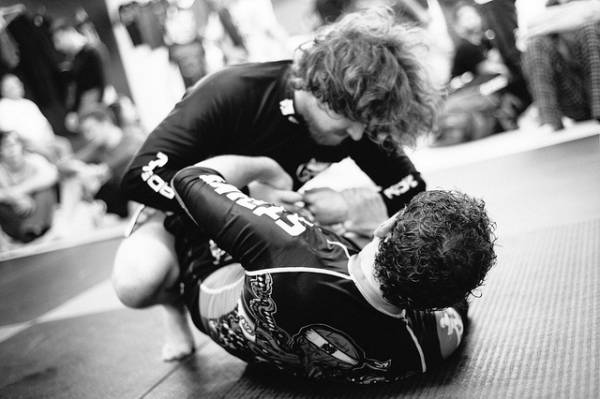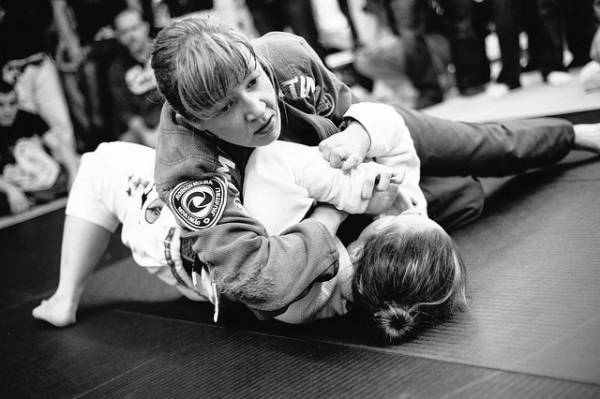Photos provided by David Brown Photography.
Brazilian jiu jitsu/submission grappling is an increasingly popular sport that is one of the component sports of the mixed martial arts (MMA) we see in contexts like the Ultimate Fighting Championship. When enthusiasts refer to “the ground game,” they are generally referring to Brazilian jiu jitsu or submission grappling (BJJ). BJJ involves working to gain superior position on an opponent and ultimately to submit that person using any of a variety of chokes (which can render an opponent unconscious) or joint locks (which can do physical damage to the affected joint). For practitioners, the possibilities, movement patterns, and combinations are endless and endlessly fascinating.
Given the increase in popularity of MMA, more people are becoming interested in training BJJ themselves. This raises many questions about how to choose an academy and a coach. Here are some points to consider when making your own choices.
Identify Your Goals
As you are likely to find if you pursue BJJ for any length of time, it can become a consuming hobby. People of all levels and tenures find themselves thinking about BJJ an inordinate amount when they are not training and making many choices that maximize their opportunities to train (e.g., maybe they’ll forgo happy hour to be able to make the evening class, or maybe they’ll get up for the 6:00am class so they can get their training in even among professional commitments and family obligations).
Notwithstanding the expansive nature of BJJ, however, different people will have different goals vis-à-vis their training. Some are interested in self-defense, while others are determined to become a grappling world champion. Still others seek a new way to get in shape. Each of these is a reasonable goal, but each will also have implications for the kind of coach you choose. Each will also require different types and levels of commitment.
Consider the Following Criteria
 Different athletic domains have different indicators of quality and experience, and BJJ is no different. As with other domains, these indicators are a good place to start to make your decision, but the final choice is likely to include some combination of convenience and gut instinct as well as harder criteria. Also, the criteria below are not hard and fast; they do not represent metaphysical certitude, as John McLaughlin is fond of saying. So, use these criteria as a set of guidelines:
Different athletic domains have different indicators of quality and experience, and BJJ is no different. As with other domains, these indicators are a good place to start to make your decision, but the final choice is likely to include some combination of convenience and gut instinct as well as harder criteria. Also, the criteria below are not hard and fast; they do not represent metaphysical certitude, as John McLaughlin is fond of saying. So, use these criteria as a set of guidelines:
Lineage:
The grappling community is still relatively small and self-policing, but it is growing and is not immune to fly-by-nighters or people looking to exploit the popularity of grappling to make a buck. Legitimate instructors should not have a problem with you expressing interest in who awarded/awards them their belts, though you should be sure to broach the subject in a respectful manner. Alternatively, if you have friends in the know, they can help you determine who has legitimate credentials. Some people have name recognition on their own, and others are easily traceable back to legitimate origins.
Belt Level:
As a rule, black belts are likely to be more proficient at grappling than brown belts, who are likely to be more proficient than purple belts and on down the line.
Teaching Ability:
Notwithstanding the comment above about belt level, being able to practice BJJ and being able to teach BJJ are two different things. So another criterion to consider is the relative ability of the coach to meet the needs of students at multiple experience levels. You can find this out to some extent by taking the free introductory classes most academies offer as a precursor to registration.
Teaching Style:
Closely linked to teaching ability is the style of teaching the coach employs. Some instructors are more emotive and nurturing while others are more regimented and reserved. No single teaching style is better or worse than any other teaching style. But different teaching styles might be more or less to your individual liking. As with teaching ability, you can get a sense of an instructor’s teaching personality by taking a free introductory class.
Reputation:
As described above, the grappling community is close-knit and aware. Pay attention to what others in the know have to say about the person you are considering taking on as a coach. Ask around about the coach’s reputation, as a person, as a business owner, etc.
Coach’s and Students’ Competition Record:
Particularly if you are interested in competing, you might want to find out about whether the coach has competed, whether competition is encouraged and supported at the academy in question, and how the coach and his/her students have fared in competition. Keep in mind, however, that training with a world champion does not automatically mean you will become a world champion. It’s certainly possible, but it’s not a given. And conversely, it is possible to have competition success while training under someone who is not a world champion him/herself.
 These guidelines for selecting a coach are just that: guidelines. Keep in mind that your needs and goals may change over time, and if that is the case, what you are looking for in a coach may change as well. Yes, I am implying that after a time you may decide you want to leave your academy and train elsewhere. Historically, practitioners have gone from white belt to black belt under the same instructor, and even nowadays, it’s certainly not advisable to jump around from academy to academy, for multiple reasons. In other words, leaving one’s academy or even thinking about it has until recently been considered by many to be blasphemous.
These guidelines for selecting a coach are just that: guidelines. Keep in mind that your needs and goals may change over time, and if that is the case, what you are looking for in a coach may change as well. Yes, I am implying that after a time you may decide you want to leave your academy and train elsewhere. Historically, practitioners have gone from white belt to black belt under the same instructor, and even nowadays, it’s certainly not advisable to jump around from academy to academy, for multiple reasons. In other words, leaving one’s academy or even thinking about it has until recently been considered by many to be blasphemous.
But times have changed – somewhat – and the reality is that in BJJ as in life, our needs and wants may develop over time. Do not go into an academy already planning to leave, but do understand that any academy gives you a certain perspective on BJJ and that there are multiple perspectives, emphases, and priorities.
As you do your research, ask yourself these questions and discuss them as appropriate with any prospective coach:
- What are your goals?
- What is your schedule like – what times of day and how many days per week will you be able to train? Does the academy have classes at times when you can attend?
- When you visit an academy, can you envision yourself spending significant amounts of time there?
- What is your rapport like with the instructor? With the other students?
- What is your general level of physical fitness? What is your age? (Coaches should be able to work with you regardless, but you want to raise any concerns ahead of time.)






